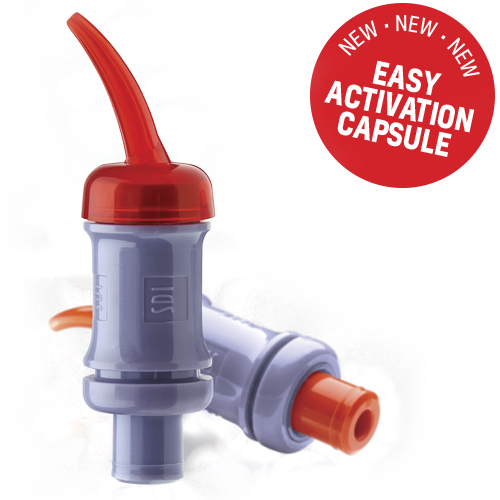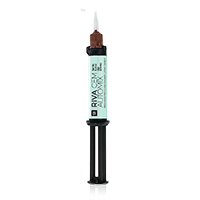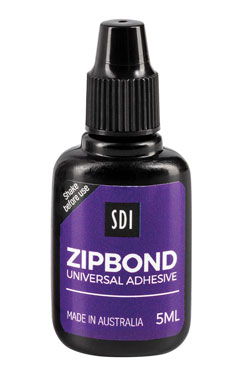Smart features for every layer of use
Aura Easyflow is a light cured flowable composite, optimised to provide the right features for every layer of use. Whether it is used as a radiopaque liner under direct restorations or superficially to repair defects in aesthetic zones, Aura Easyflow is engineered to maximise clinical success.
Engineered filler technology
Aura Easyflow is based on the successful filler technology
utilised in SDI’s Aura range of composites. Its state of the art
filler system defines its versatility for multiple clinical needs to
ensure high strength and natural aesthetics.

Optimal flow for cavity adaptation
Producing conservative restorations that preserve the tooth, often leads to structural irregularities on cavity walls. A flowable composite must adapt into every irregularity to form a complete seal at the tooth-restorative interface. Filler loading affects the flowability of a composite1 and at 56% (filler load by weight), Aura Easyflow is optimal to achieve adequate flow around the cavity walls.
Aura Easyflow’s tip design for complets and syringes, makes it easy to inject the material into cavities of any depth and any location within the mouth. Tactically, the clinician can be confident that the material is placed with precision.

High visibility on radiographs
Over time, it is important to evaluate the contours of restoration and distinguish between the restorative material and secondary caries1. Aura Easyflow contains barium glass, selected for its high radiopacity and therefore, high visibility on radiographs.
Aura Easyflow makes it easier to see the distinction between tooth and restorative material, enabling confident clinical diagnosis throughout the life of the restoration.

Strong mechanical properties
Aura Easyflow’s strength asserts its use as a versatile restorative material. With an impressive compressive strength of 421MPa, Aura Easyflow’s ability to withstand forces of mastication, meets that of conventional composites and is superior in the flowable composite category.
Flexural strength influences the use, stability and clinical success of a restoration2. Aura Easyflow displays the ideal amount of flexural strength to enable its use in a variety of applications. The material has enough flexural strength to be used on the surface of Class I and Class II restorations that are often under masticatory stress, while maintaining enough flexibility to be used in Class V scenarios.



Easy shade matching
Aura Easyflow is designed with four unique shades to simplify colour selection in aesthetic zones and enable better inventory management. Shade selection is simplified by three methods:
- Shades are arranged according to chroma, from weaker intensity to higher intensity of color.
- Shades are equidistantly spaced, creating visual logic to the eye.
- Shades have a single opacity, making it easier to predict the final aesthetic of the restoration.
Four unique Aura Easyflow shades cover 16 VITA® A1–B4® shades, enabling an easy switch from traditional shading systems

Approximate equivalence to VITA® classical shade guide
Optimised optical properties
Aura Easyflow contains the same optical properties as Aura, Aura Easy and Aura Bulk Fill. The development of Aura Easyflow completes the Aura composite range to provide a restorative material for every direct clinical use.
Aura Easyflow’s filler and resin technology is specially tailored to display a chameleon effect. There is an optimal blend of translucency, opacity, opalescence and fluorescence to mimic that of an unrestored, natural tooth.
Stable aesthetics over time
Flowable composites are often selected as a material of choice for the repair of superficial defects. Particularly in the aesthetic zone, it is important that the shade remains stable for the life of the restoration. Aura Easyflow demonstrates colour stability over time, which facilitates long lasting satisfaction with the aesthetics of the restorative work undertaken.

Technical Table
| Filler load (total) | 56% weight |
| 32% volume | |
| Depth of cure (mm) | 2 |
| Compressive strength (MPa at 24 hours) | 421 |
| Flexural strength (MPa at 24 hours) | 128 |
| Volumetric shrinkage (%) | 4.8 |
| Radiopacity (%Al) | 265 |
* SDI internal data
- Kusai Baroudi et al (2015), ‘Flowable Resin Composites: A Systematic Review and Clinical Considerations’, Journal of Diagnostic Research, NCBI
- Sayna Shamszadeh et al (2013), ‘Comparison of Flexural Strength of Several Composite Resins Available in Iran’, Journal of Dental School
~ Yap AU et al (2002), ‘Changes in flexural properties of composite restoratives after gaining in water’, Journal of Operative Dentistry, 27:468-74







 Central/South America -
Central/South America - 
